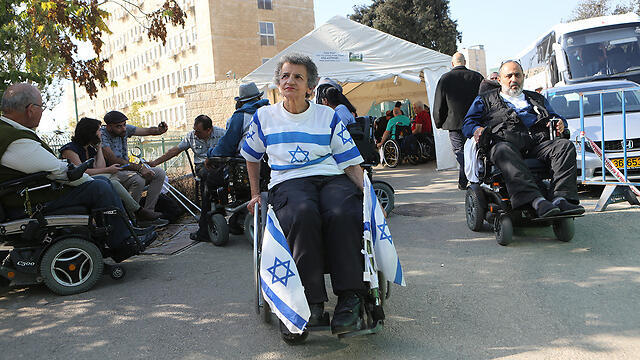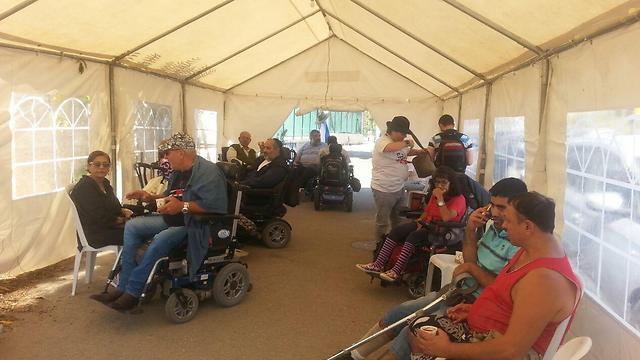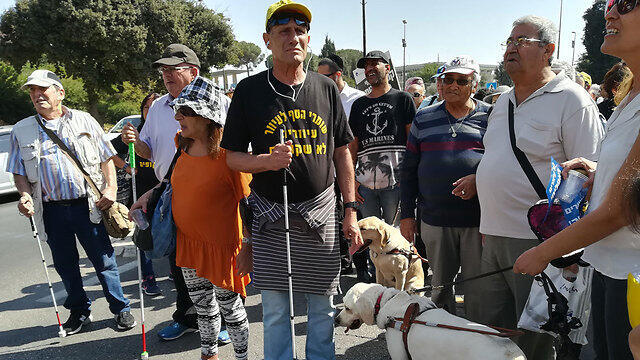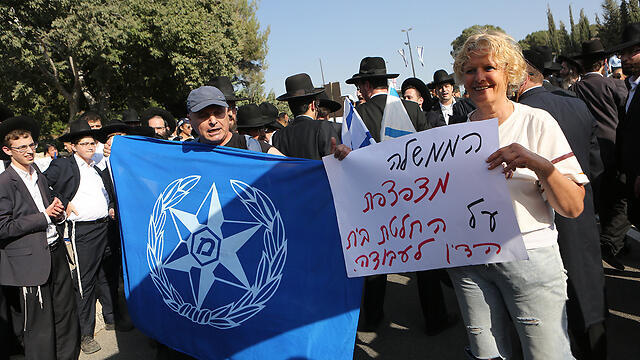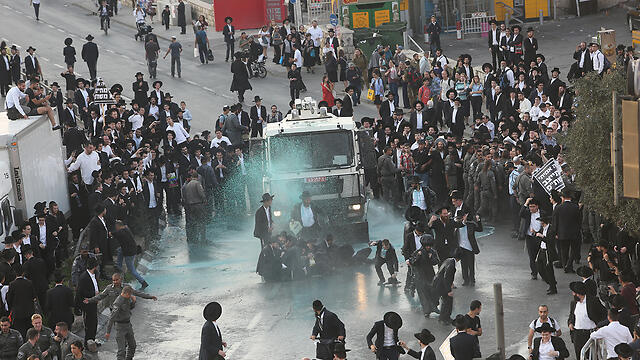Getting your Trinity Audio player ready...
With the Knesset reconvening for the beginning of its winter session Monday, as many as six different demonstrations—including disabled persons, the blind, police and Israel Prison Service retirees, environmentalists, cannabis legalization activists and Haredim—were held simultaneously outside the Knesset building, all vying for attention from the government and parliament members.
First on the scene were members of the groups of disabled people objecting to the agreement recently signed with representatives of some of disabled protest groups and government representatives to raise disability benefits .
9 View gallery
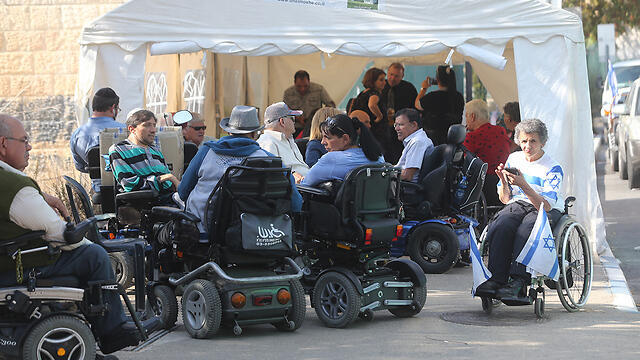

The newly erected disabled protest tent will be manned 24 hours a day
(צילום: אלכס קולומויסקי)
With prior police consent, the disabled activists erected a protest tent opposite the Knesset building, to be manned 24 hours a day for a week, serving as headquarters for activists leaving for protests all over the country, including to participate in blockings of roads and strategic buildings.
Dr. Amihai Tamir, chairman of one organization, explained the reasoning behind the tent's creation. "Knesset returns to work (Monday), and this is the money time for us. The entire disability benefits issues will be resolved in this winter session, for better or worse. This is where things will be decided, and that's why we're here to express our just protest until an amendment is made to the National Insurance Institute Law allowing us to make a respectable living," he said.
The leader of the Disabled Panthers group, Eyal Cohen, explained the protest was intentionally staged outside the Knesset so "MKs could see us and know we're here. Some people will be going into the building to participate in discussions and we want MKs to come to our tent to talk things over and resolve this crisis."
The chairman of the organization of people afflicted with polio, Yehuda Doron, said, "We tried not reaching the point where we have to create a protest test and get every disabled person on board with us until we get the result we want. This tent will be a second home to the disabled, from which activities will be carried out nationwide. We plan to close the country's sea and airways, its refineries and other strategic locations. We're also planning a 'day of rage' wherein every group of disabled people will block access to their city's most important buildings. It may be the only recourse we have left."
As the chairperson of the disabled protest's headquarters Naomi Moravia—who supported the government agreement—left the Knesset, she was accosted by protesters who tried to break through police barricades to get to her.
Another, somewhat more welcome guest, was Minister of Labor and Welfare Haim Katz, who met with the protesters objecting to the agreement reached between some of the protesting organizations and the Histadrut LaborFederation and government representatives. Katz criticized the agreement, partly due to the fact no paper was signed and only verbal agreements were made, but also for the fact neither he nor the people in his ministry were party to the negotiations.
"Frankly, I think you deserve minimum wage and I spoke to the prime minister about it," Katz added.
Near the disabled protest's tent, some 80 blind people demonstrated as well, calling to raise the mobility benefit they receive—intended to pay for transportation—from NIS 790 to the sum of the benefit received by the disabled, NIS 2,364.
9 View gallery
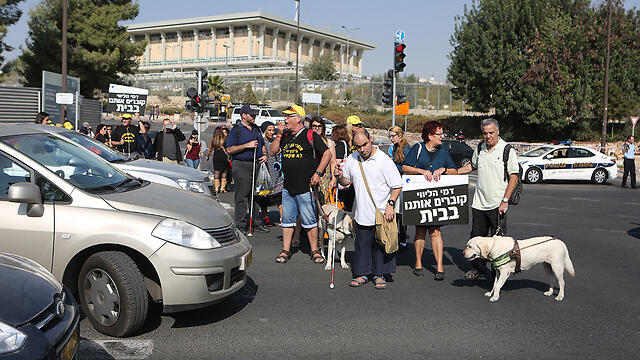

Blind protesters were also on hand to demand their transportation benefits be equated to disability benefits
(צילום: אלכס קולומויסקי)
Later this week, a petition will be submitted to the High Court of Justice seeking to put an immediate stop to what the blind activists have called discrimination. Director of the Israeli Center for the Blind Nati Bialistok-Cohen said, "People afflicted with blindness are forced to be prisoners in their own homes and to live in abject loneliness, because they simply can't afford to leave."
"I get an NIS 470 benefit for mobility every month. It's enough to go to the supermarket every now and again and to go to Tel Aviv for a doctor's appointment once a month. The rest of the month I simply can't afford to leave home," said Hisham Husham, one of the blind protesters.
Another participant in the blind protest said the government "sentenced the blind community to a life of loneliness. Many blind people are forced to think twice before ever leaving their house. We don't want more than we deserve, merely to receive the same benefits as those with disabled limbs. Our blindness is no less of a disability, and despite the fact our legs work, we can't walk on our own."
9 View gallery
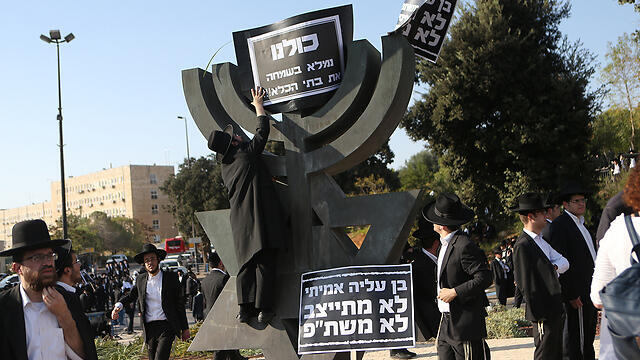

Haredi protesters near the Knesset, hanging a sign saying, "We'll happily fill the prisons"
(צילום: אלכס קולומויסקי)
The recent wave of Haredi protests ,demonstrating against the arrest of draft dodgers and against conscription to the IDF in general, reached the Knesset as well, with some 1,000 protesters arriving to demonstrate there, trying to force their way into the building.
9 View gallery
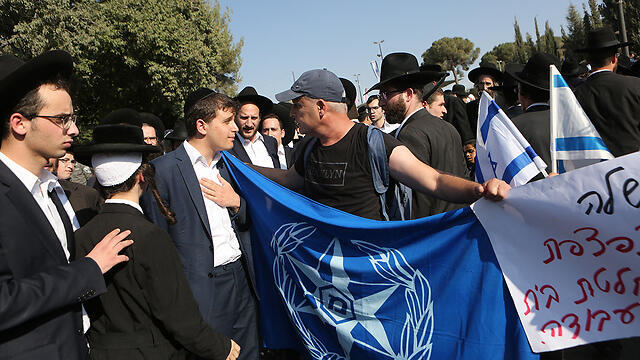

Haredi protesters clashed with police retirees also demonstrating near the Knesset
(צילום: אלכס קולומויסקי)
Also picketing near the parliament were police retirees, who demonstrated to receive the same pension as retired army personnel. The police retirees had a shouting match with the Haredi protesters, with the former calling on the latter to enlist and the latter shouting back it was the "army of heretics."
While their compatriots were protesting near the Knesset, members of the hardline Jerusalem Faction blocked both the entrance to Jerusalem and exit from it near the Chords Bridge.
Hundreds of protesters there broke the windows of a bus nearby and disrupted the light rail's traffic in the area.
Police on the scene instructed them to clear the area, as they were there unlawfully, and when the Haredi protesters refused they were dispersed using crowd-control methods.


